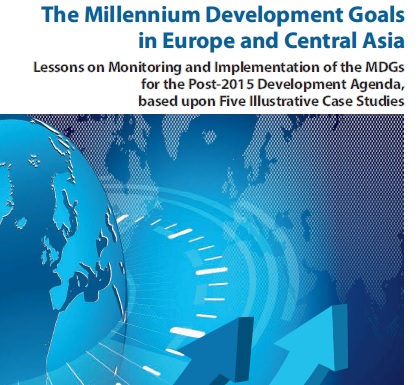
Before we embark on the most ambitious development agenda ever as expressed by the proposed Sustainable Development Goals (SDGs), we must learn from the past. The experience with implementing and monitoring the Millennium Development Goals (MDGs) holds many lessons for the SDGs. These lessons are highlighted in a new report by the UN system in Europe and Central Asia that is launched in Geneva today.
The main lessons fall into three categories:
- The SDGs will be relevant for all countries and cover many topics but most be adopted to the specific circumstances in all countries. There is much to learn from Europe and Central Asia, where many of the developing and transition countries have adapted the global MDGs to national and local circumstances and to the needs of specific vulnerable groups. In the process, a number of challenges have emerged, such as comparing data across countries.
- Monitoring the post-2015 agenda will require better data - a “data revolution”. Tracking progress under the MDGs has been hampered by data gaps, discrepancies and reporting delays. This experience suggests that building statistical capacities remains one of the major challenges. There is also a need to get the data framework right, such as developing the right indicators, integrating new data sources, and selecting the right base year.
- To support practical implementation at the national and regional level, the experience with the MDGs points out that goals and targets should be designed to ensure accountability. It has to be clear “who does what” and who is responsible for outcomes and shortcomings. In addition, the implementation of goals requires mobilizing financial resources, institutional solutions for cross-sectoral coordination within governments, and regional cooperation to address transboundary issues.
“We must learn from our successes, but also from our failures to perform better in the future. A key lesson from the MDGs is that we need more and better data to monitor the implementation of the SDGs. We need a true ‘data revolution’ with new sources of data and better integration of statistics into decision-making”, said Christian Friis Bach, Executive Secretary of the United Nations Economic Commission for Europe (UNECE).
“National experiences show that a country can – on average – be meeting an MDG, while still leaving behind pockets of many vulnerable people. These could be Roma, refugees, the internally displaced, people with disabilities, or others. We need to go beyond the ‘tyranny of averages’, and ensure that the SDGs can reflect the needs of the least fortunate”, said Neil Buhne, Director of the UNDP Office in Geneva.
All of these lessons are highly relevant to the design of the post-2015 agenda. In the report, they are supported by five case studies of national MDG achievement from Bosnia and Herzegovina, Kyrgyzstan, Moldova, Montenegro and Ukraine, which underscore the importance of implementation efforts at the national level.
The report is available at: http://www.unece.org/index.php?id=38800
Note to editors
The report was prepared within the United Nations Regional Coordination Mechanism for Europe and Central Asia and the United Nations Development Group for Europe and Central Asia, as part of their ongoing work on the MDGs and the post-2015 development agenda.

